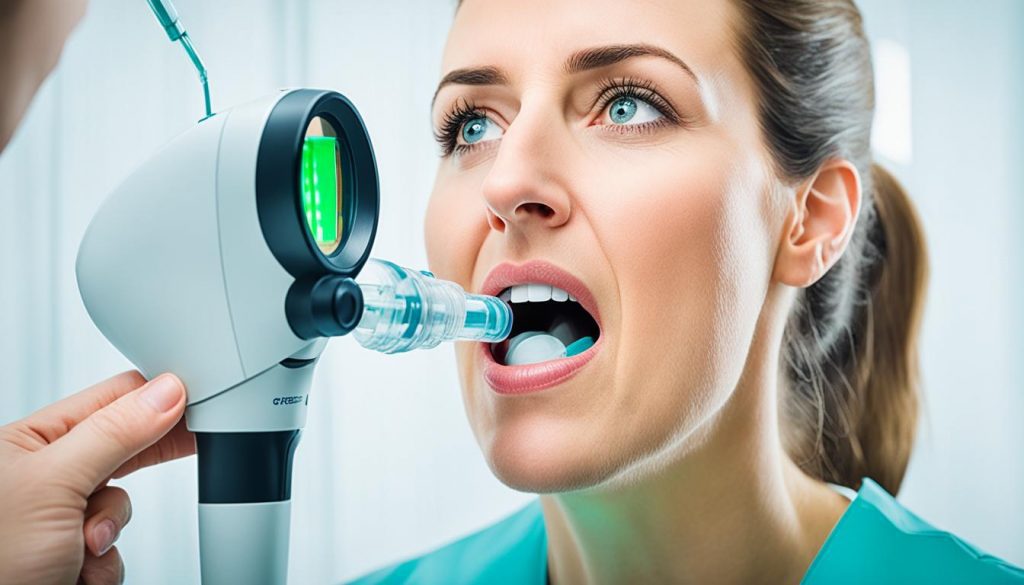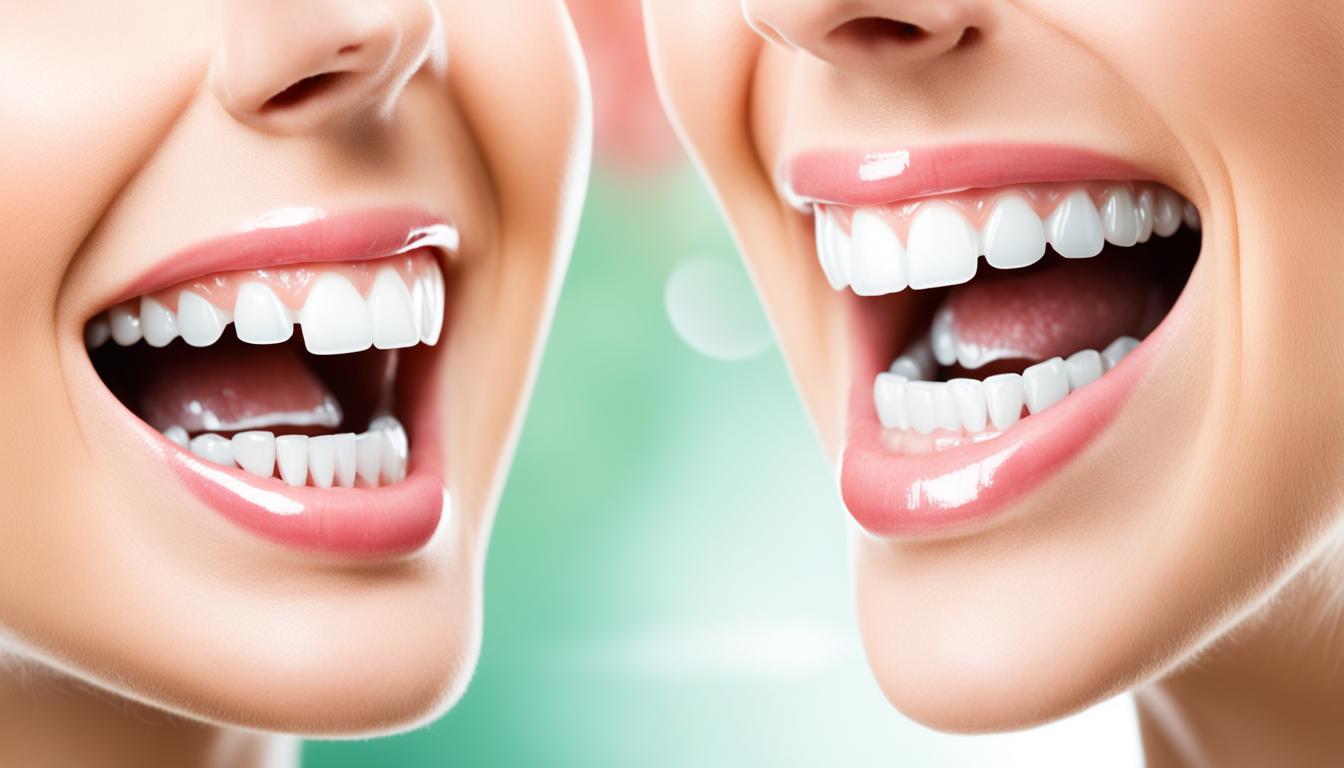Bad breath, also known as halitosis, happens when an unpleasant smell comes from the mouth. It’s often because of not taking good care of our teeth, gum disease, not having enough saliva, eating certain foods, and other health issues. Many people face bad breath, and it can really affect how they feel about themselves and act around others.
Bad breath could also point to more serious teeth or health problems. Taking care of the main reasons for bad breath is key. Recently, stem cell therapy has shown promise in treating issues like bad breath. Stem cells can help fix damaged parts and help the mouth heal. This opens up new ways to have a healthy mouth and fresh breath.
Key Takeaways:
- Bad breath, or halitosis, can be caused by poor oral hygiene, gum disease, dry mouth, certain foods, and underlying medical conditions.
- Addressing the underlying causes of bad breath is crucial for effective treatment.
- Stem cell therapy is a promising approach for treating bad breath, as it can regenerate damaged tissues and promote healing in the mouth.
- Maintaining good oral hygiene, visiting the dentist regularly, and practicing a healthy lifestyle can help prevent and manage bad breath.
- If you’re concerned about bad breath, consult a dentist or healthcare professional for a proper diagnosis and personalized treatment options.
Causes of Bad Breath and Prevention Strategies
Bad breath, or halitosis, often starts with poor oral hygiene. Food bits and bacteria in your mouth make smelly sulfur compounds. But other things like gum disease, dry mouth, smoking, and certain foods can cause it too. Medications and illnesses such as diabetes and liver disease are also to blame.
To keep your breath fresh, it’s key to have good oral habits. This means:
- Brushing your teeth twice a day with fluoride toothpaste
- Flossing daily to get rid of food and plaque between teeth
- Using a mouthwash to fight bad breath and bacteria
- Cleaning your tongue to remove bacteria and leftover food
- Going to the dentist regularly for cleanings and to check for dental problems
Along with caring for your teeth and gums, other steps can help fight bad breath:
- Steer clear of tobacco, which dries out your mouth and harms your gums
- Drink lots of water to avoid dry mouth, which makes breath smell bad
- Eat a balanced diet and avoid foods that leave a strong smell
By doing these things every day, you can cut down on bad breath. You’ll have fresher breath and better oral health.
Symptoms and Diagnosis of Bad Breath Disease
Bad breath often shows as a constant, bad smell coming from the mouth. This can make social situations awkward and lower a person’s confidence. Bad breath can also come with:
- A dry mouth: A lack of saliva leads to mouth dryness. This allows bad-smelling bacteria to grow more easily.
- A bad taste in the mouth: Those with bad breath might notice a nasty taste. This can happen even after they brush their teeth or use mouthwash.
- A white coating on the tongue: Bacteria and debris on the tongue can create a white or yellowish layer, adding to the smell.
- Post-nasal drip: Too much mucus in the throat can worsen breath smell.
To find out what causes bad breath, a visit to the dentist or a doctor is needed. They will check the mouth and learn about the patient’s health habits and history. Sometimes, they might do tests like checking saliva or breath scent. These help find the cause of bad breath and how to treat it.

Common Causes of Bad Breath
| Possible Causes of Bad Breath | Contributing Factors |
|---|---|
| Poor Oral Hygiene | Not brushing or flossing well adds to plaque and bacteria growth. |
| Gum Disease | Gum swelling and infection can lead to worse breath. |
| Dry Mouth | Less saliva means less cleaning and more bacteria. |
| Dietary Factors | Eating foods like garlic and onions can cause breath issues. |
| Systemic Diseases | Illnesses like diabetes, liver disease, and lung infections can affect breath. |
Stem Cell Therapy for Bad Breath
Stem cell therapy is an exciting area in health care. It shows great promise for improving our oral health and getting rid of bad breath. This method uses the power of stem cells to fix the main causes of mouth odor. It also helps keep our teeth and gums healthy.
Having good oral health is essential for fresh breath. Bad oral habits, gum disease, and inflammation can lead to halitosis. Traditional treatments like mouthwashes only cover the symptoms. They don’t tackle the real problem. Stem cell therapy offers a new approach by focusing on these root issues. It aims for a lasting solution to oral health.
Stem cells are amazing because they can turn into different types of cells. They can repair damaged tissues in our mouths. By putting stem cells in the damaged areas, they start a healing process. This leads to the growth of healthy tissue and less inflammation. This helps heal damaged areas and fights off bad breath.
Recent studies on stem cell therapy for oral health are encouraging. They show that stem cells can fix oral tissues, make gums healthier, and lessen bad breath. These results help researchers look further into stem cell therapy. They see it as a new treatment for people with chronic bad breath.
Stem cell therapy for bad breath is still being studied, but there’s a lot of hope for it. More research is needed to make the treatment better. We need to find the best way to use stem cells and make sure it’s safe for a long time.
Stem cell therapy is an exciting development in fighting bad breath. It deals with the deep causes of mouth odor and improves our oral health. This gives people new hope for a lasting solution to halitosis.
| Treatment Benefits | Research Findings |
|---|---|
| Regenerates damaged oral tissues | Studies have shown the potential of stem cells to promote tissue regeneration in the oral cavity. |
| Reduces inflammation | Stem cell therapy has been found to significantly reduce inflammation associated with bad breath. |
| Promotes overall oral health | Clinical studies suggest that stem cell therapy improves gum health and contributes to optimal oral hygiene. |
Conclusion
Bad breath, or halitosis, affects many people and can harm their confidence. It is often caused by things like poor dental care, gum disease, or not enough saliva. Finding and treating the cause is key to dealing with bad breath.
Recently, stem cell therapy has emerged as a new way to treat bad breath. Stem cells can regenerate tissues, which might help fix problems in the mouth. This could mean fresher breath and better dental health for many.
More research is needed to fully grasp how stem cell therapy could help. However, its potential is big in improving oral health. With stem cells, we might find new ways to help those with tough bad breath issues. This could make their lives and dental health much better.

